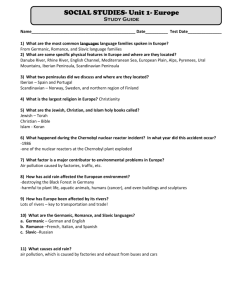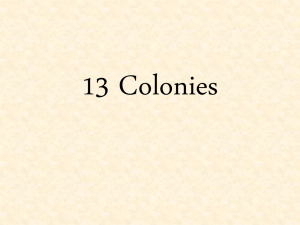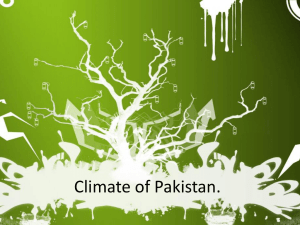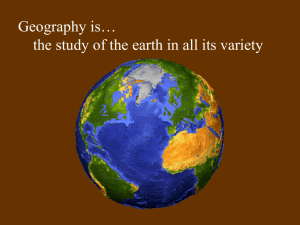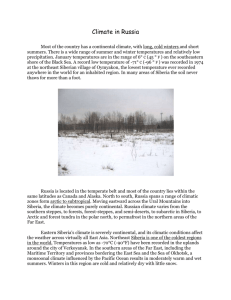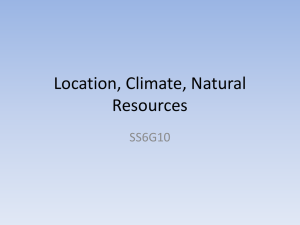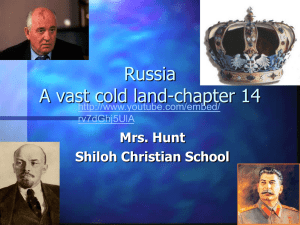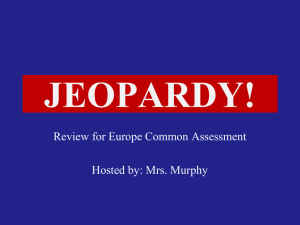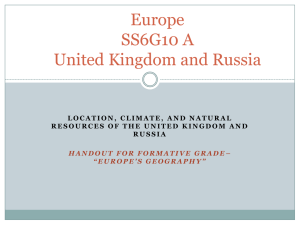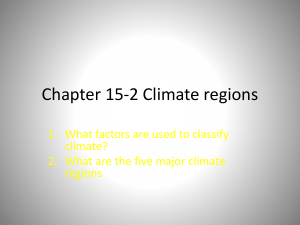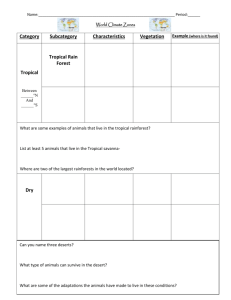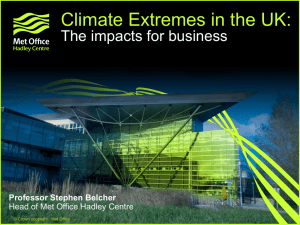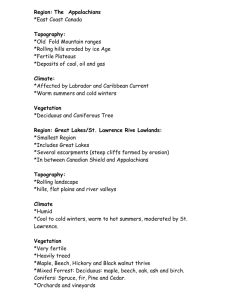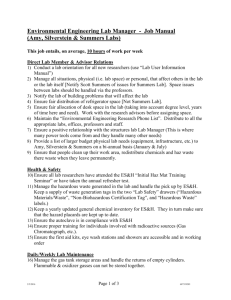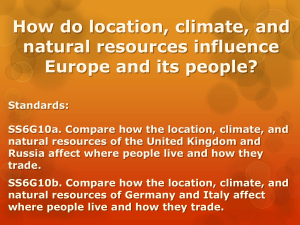File
advertisement
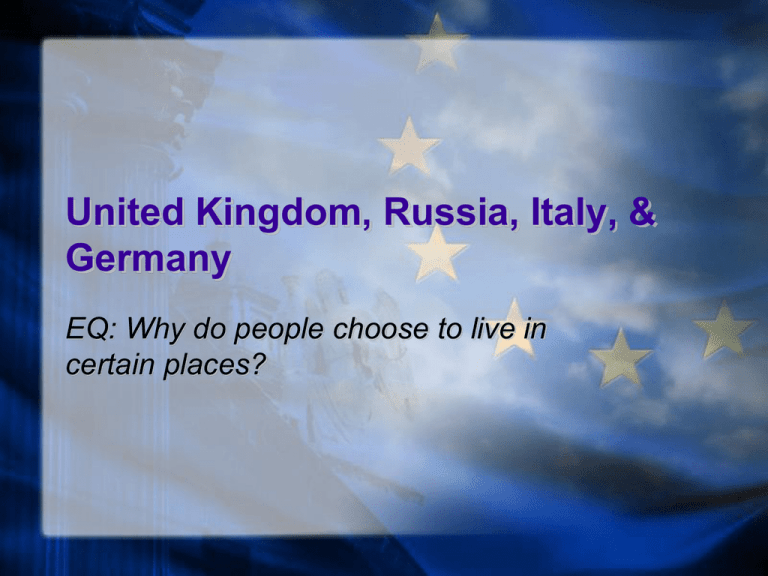
United Kingdom, Russia, Italy, & Germany EQ: Why do people choose to live in certain places? United Kingdom Consists of 4 regions: England Scotland Wales Northern Ireland Location UK’s location has helped the country become an international banking and insurance center -more foreign bank branches than any country in the world Location helps with US trade -US is UK’s #1 trading partner! Location UK’s location makes it HUB for trade Across the English Channel is France, west is Ireland, east is Scandinavian Peninsula 10 major ports along the coast Climate The UK has a mild (temperate)climate, with plentiful rainfall all year round. -No section go without rain for more than two weeks -Winter are mild and wet; summers are warmest in the south The Gulf Stream crosses the Atlantic Ocean Natural Resources Major export: manufactured goods coal, petroleum, natural gas, iron ore, lead, zinc, gold, tin, limestone, salt, clay, chalk, slate, arable land Major Industries: automobile production, steel manufacturing, shipbuilding Natural Resources Fishing is a large and profitable industry in UK Nearly 25% of country has arable land (suitable for faming) -Over half of the land is used for farms Population / Where People Live/Land Area About 60 million people live in the United Kingdom. Around 90% of the UK’s people live in cities. London has over 7 million people. Land Area – 243,610 sq. miles Russia Location Location Spans two continents – Europe and Asia Shares a border with 15 countries At its closest point, Us and Russia are only 3 miles apart across the Bering Straight! European Russia is mostly landlocked (surrounded by land on all sides) Exceptions – Murmansk and St. Petersburg Climate Most of the western part of Russia has a humid continental climate. Summers are warm and rainy, while winters are cold and snowy. Only two seasons: winter and summer. Eastern Russia experiences cool, short summers and long, snowy winters. Asian Russia (Siberia) northern border is a tundra (nearly frozen, treeless plain). 73% of population lives in European Russia Natural Resources Major export: petroleum Bauxite, coal, copper, fishing, gold, iron ore, lead, natural gas, nickel, tin, & zinc Volga River – hydroelectric power Lots of forest with lumber have been cleared to build European cities With Russia’s harsh climate and rugged terrain, natural resources and difficult to get to Population/ Where People Live/ Land Area Russia is one of the most populous countries in the world, with 145.5 million people. Most people live WEST of the Ural mountains, where the climate is mildest and the land is the most fertile. Land Area – 17,098,242 sq. miles Germany Location Location North Central Europe – European Plain Southern region – mountainous Central region – hilly and mountainous Northern region – flat Rhine River – most important commerical waterway in Europe Climate Because of its mountainous landscape, Germany has a cool climate. West – winters are mild and summers are cool with rainfall year round East – winters are very cold and summers are very hot with long dry periods Natural Resources An area in western Germany called the Ruhr ranks as one of the world’s most important industrial centers because of its rich deposits of coal and iron ore. Germany imports about 1/3 of its food, although farmers grow grains, vegetables, and fruits. Germany’s Black Forest is a huge producer of timber, although recently acid rain has severely damaged tree growth. Natural Resources Iron ore, coal, potash, uranium, nickel, natural gas, and copper Timber is also a resource but most of it has been cut down 1/3 of land is arable Population/Where People Live/Land Area Germany’s population is 82.6 million people. Because of its rivers and fertile land, Germany’s northern plain has many cities and towns. One of Europe’s most important waterways flows through southern Germany. 85% of people live in cities (Berlin is the largest and the capital) Land Area: 357, 022 sq. miles Trade Rhine River is important for trade Many German cities lie on the Rhine Italy Location Location Long, boot-shaped peninsula surrounded by the Mediterranean Sea Alps form northern border Apennine Mountains run from the Alps to the sea 2 small islands, Sardinia and Sicily, are part of Italy Climate Most of Italy has a mild climate of sunny summers and rainy winters. In spring and summer, hot dry winds called siroccos blow across Italy from North Africa. Temperate (mild) climate with regional differences Coast – mild winters, warm summers Mountains – cold, wet, snowy winters and humid summers Natural Resources Major export: metal coal, petroleum, natural gas, iron ore, lead, zinc, gold, tin, limestone, salt, clay, chalk, gypsum, potash, silica sand, slate, 26% arable land Grapes and olives are important crops More than 800 ports for fishing boats Population/Where People Live/Land Area Italy has 57.2 million people. About 70% of the population live in towns and cities. (More than 90% of Italians work in manufacturing and service industries.) 7 out of 10 people live in urban areas (Rome, Naples, Milan, Turin) Almost half of the people live in the northern 1/3 of the country Land Area: 301,340 sq. miles Trade Apennine Mtns. Are like a backbone across Italy They affect where people live and how they transport goods and people Location on Mediterranean Sea affects trade with other countries Has a long history of shipping goods to Africa, Asia, and Europe
